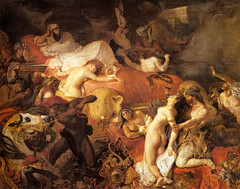| 14690981737 | Anarchism | A doctrine or belief that all governments are oppressive and should be restrained or abolished, allowing people to work freely together | | 0 |
| 14690981738 | Animisn | the attribution of a soul to plants, inanimate objects, and natural phenomena. | | 1 |
| 14690981739 | Aristocracy | A government in which power is in the hands of a hereditary ruling class or nobility | | 2 |
| 14690981740 | autonomy | self-government | | 3 |
| 14690981741 | Bias | Prejudice in favor of or against one thing, person, or group | | 4 |
| 14690981742 | Bureaucracy | a system of government in which most of the important decisions are made by state officials rather than by elected representatives. | | 5 |
| 14690981743 | Centralization | the concentration of control of an activity or organization under a single authority. | | 6 |
| 14690981744 | circa | approximately | | 7 |
| 14690981745 | City state | In the ancient world, an independent or autonomous area, including a city, with one shared government | | 8 |
| 14690981746 | coercive | Forced service unwillingly | | 9 |
| 14690981747 | commerce | Exchange of goods through buying or selling, particularly on a large scale | | 10 |
| 14690981748 | Continuity | Consistent existence or operation of something of something over a period of time | | 11 |
| 14690981749 | corroborate | Confirm or give support to a statement, theory, or finding | | 12 |
| 14690981750 | Demography | the study of statistics such as births, deaths, income, or the incidence of disease, which illustrate the changing structure of human populations. | | 13 |
| 14690981751 | Diasporic communities | Sub-populations formed by groups of people with similar physical or social qualities that separate themselves from the rest of society | | 14 |
| 14690981752 | Diffusion | the spreading of something more widely | | 15 |
| 14690981753 | Dynasty | a line of hereditary rulers of a country. | | 16 |
| 14690981754 | egalitarian | Believing in the principle that all people are equal and deserve equal opportunities | | 17 |
| 14690981755 | Empire | A political unit comprising of several countries under the rule of one sovereign government or an emperor. | | 18 |
| 14690981756 | epidemic | A widespread outbreak of a particular disease | | 19 |
| 14690981757 | hierarchy | Social or political system based on the order of rank of people according to importance | | 20 |
| 14690981758 | Indentured Servitude | Form of service primarily used during the early colonial period in the americas | | 21 |
| 14690981759 | indigenous | originating or occurring naturally in a particular place; native. | | 22 |
| 14690981760 | infrastructure | the basic physical and organizational structures and facilities (e.g., buildings, roads, and power supplies) needed for the operation of a society or enterprise. | | 23 |
| 14690981761 | Legitimacy | Belief that a rule, institution, or leader has the right to govern | | 24 |
| 14690981762 | Migrants | People or animals who go through a stage of migration | | 25 |
| 14690981763 | Monarchy | A government ruled by a king or queen | | 26 |
| 14690981764 | Monopoly | A market in which there are many buyers but only one seller. | | 27 |
| 14690981765 | Monotheism | the doctrine or belief that there is only one God. | | 28 |
| 14690981766 | monsoon winds | Seasonal wind of the Indian Ocean and Southern Asia, blowing from the northeast in winter | | 29 |
| 14690981767 | nobility | A high-ranking social class | | 30 |
| 14690981768 | nomad | a person who moves from place to place | | 31 |
| 14690981769 | Pastoralism | Way of life in which people depend on the herding domesticated animals for their food | | 32 |
| 14690981770 | Patriarchal | Gender system originating from many of the first civilizations in which women are subordinate to men in the family and in society generally | | 33 |
| 14690981771 | peasant | a poor farmer of low social status who owns or rents a small piece of land for cultivation | | 34 |
| 14690981772 | Polytheism | Belief in many gods | | 35 |
| 14690981773 | primary source | Artifact, document, diary, manuscript, or any other source of information that was created at the time under study | | 36 |
| 14690981774 | Propoganda | Information of a biased nature used to promote or publicize a particular cause or point of view | | 37 |
| 14690981775 | Revolution | A sudden shift in authoritative power, often obtained through violence | | 38 |
| 14690981776 | secondary source | Information gathered by someone who did not take part in or witness an event | | 39 |
| 14690981777 | Secular | Concerned with worldly rather than spiritual matters | | 40 |
| 14690981778 | Serf | The state of serving as a serf on an estate, a system in which labor is exchanged for an allotment of land | | 41 |
| 14690981779 | Shamanism | In many early societies, a person believed to have habilita to act as a bridge between living humans and supernatural forces, often by means of trances induced by psychoactive drugs | | 42 |
| 14690981780 | Slaves | Person legally owned by another person, thus making them property with no individual rights | | 43 |
| 14690981781 | State | A compulsory political organization with a centralized government that maintains a monopoly of the legitimate use of force whiting a certain geographical territory | | 44 |
| 14690981782 | Syncretic beliefs | A combination of multiple religious beliefs such as Gnosticism, Christianity, and Greek philosophy. | | 45 |
| 14690981783 | Theocracy | A system of government in which priests rule in the name of god or a god | | 46 |
| 14690981784 | Totalitarianism | A system of government in which priests rule in the name of god or a god | | 47 |
| 14690981785 | Urbanization | The physical growth of a rural area into a city | | 48 |









































